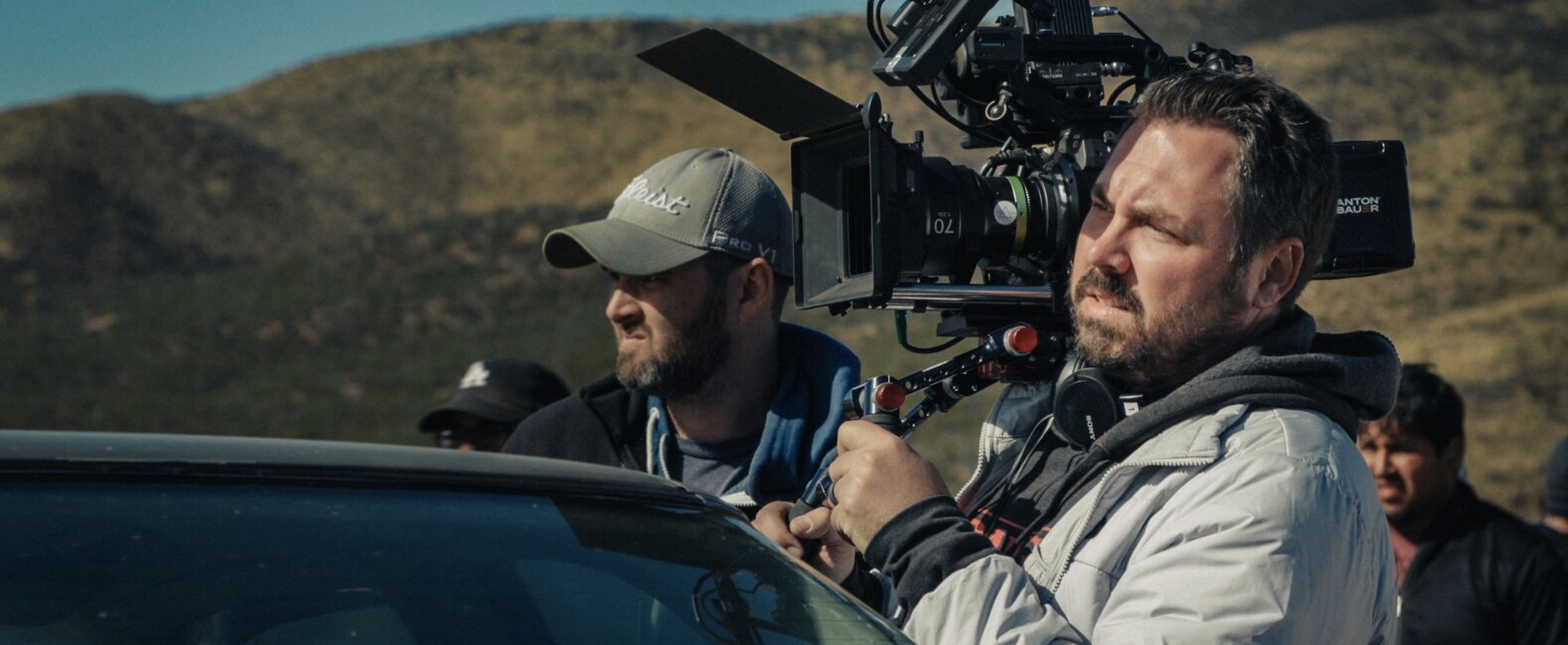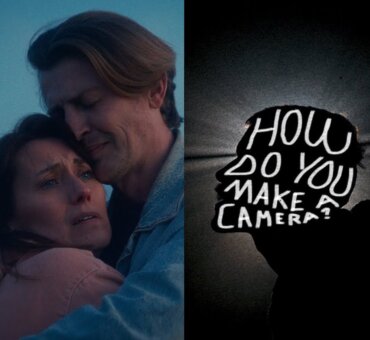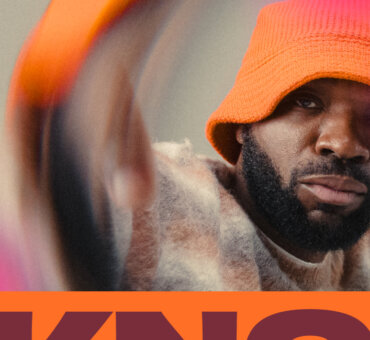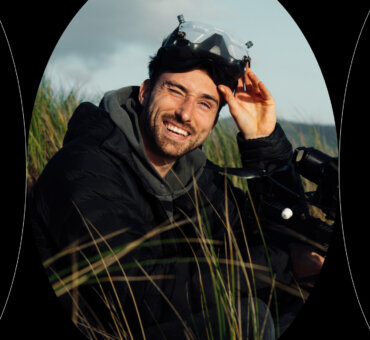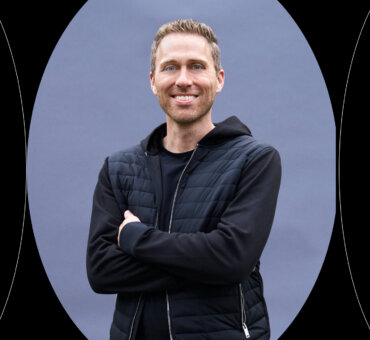Filmmaker, director, and co-founder of the renowned YouTube channel Film Riot, Ryan Connolly is known for his stellar work in VFX, action, and thrillers. Read his interview to learn more about the role music plays in his storytelling, his favorite projects, and how he uses Musicbed to find the right music for his projects.
Musicbed: What sparked your passion for filmmaking and storytelling?
Ryan Connolly: I think the initial spark for storytelling came at a very young age, having ideas in my head that I wanted to get out. I would do plays for my family, which I think all kids do, but it just seemed like they weren’t seeing what I was seeing. They weren’t laughing in the right places or really caring about the story I was trying to convey. But then my dad brought home our first camera when I was around six years old. It came out of this briefcase-type thing, almost a James Bond moment really. I have a vivid memory of looking through the viewfinder, this one singular perspective that would allow me to get people to see exactly what I wanted them to. That was the first spark of visual storytelling for me. And then it was Jurassic Park in 1993. I saw that when I was 11 and it was the most insane theater experience I had ever had. It wasn’t just the visual effects that no one had seen before, at that time, I had never seen a movie so intense either. So it was awakening for me that you could have this gift, this experience, where you feel unsafe in a safe place, and from that point on, I needed to know who that Spielberg guy was, what a director was, because I needed to do that.
What keeps you motivated and creatively inspired?
Honestly, there’s just this relentless drive to tell stories engrained from childhood. It’s the only thing that I’ve ever wanted to do. So, it’s just this endless fire that keeps burning. But as I age, it does get a little harder to keep the passion at the same level, especially when you start moving toward the industry more. I’ve been pitching out in Hollywood for the past six years. It really is a parade of rejection and that does make you winded at some point. The really big blessing has been Film Riot. The community that we built has helped keep my passion alive because there’s this whole community that believes in us, is kind enough to support us, shows up when we make something, gives feedback, and send messages that make us realize what we’re making is worth a damn. The main heart of Film Riot has always been toward community, to give information freely hoping to help the next generation of filmmakers. Every now and then we get messages telling us the show did help in this way or that—that Film Riot was a part of their filmmaking journey. And for me, that completely reignites the fire like nothing else can.
What makes a story visually appealing?
For me, the best visuals are firmly ingrained in theme and character. I always say if I don’t know what the theme is, I don’t know where to put the camera. Regardless of genre, there needs to be that thematic element that acts as your north star. We’ve all seen these gorgeous visuals that just don’t land. It looks cool, but it’s not gripping you as much as this indie film that didn’t have that budget to make that expansive shot. But then we do get these expansive shots like those from Dune: Part Two, which all land harder and louder than the majority of large-scale films. And I think that is because Villeneuve is a master of layered storytelling.
What role does music play in storytelling?
Music is firmly ingrained into the emotion of the story. It helps set the stage for exactly what the scene means, and what you should be feeling. One of the things I really love about music is that a character, to some extent, can be a blank canvas: they can give a blank look, do very little, and the music will be their internal dialogue, so to speak. It will take you the rest of the way there. So now you’re thinking with the character because the music gets you on the same page as what the story wants to drive you toward. All of a sudden you’re assuming the thoughts that the character might be thinking and while that can be done without music, music is such a powerful tool in controlling the tone and the experience of the story.
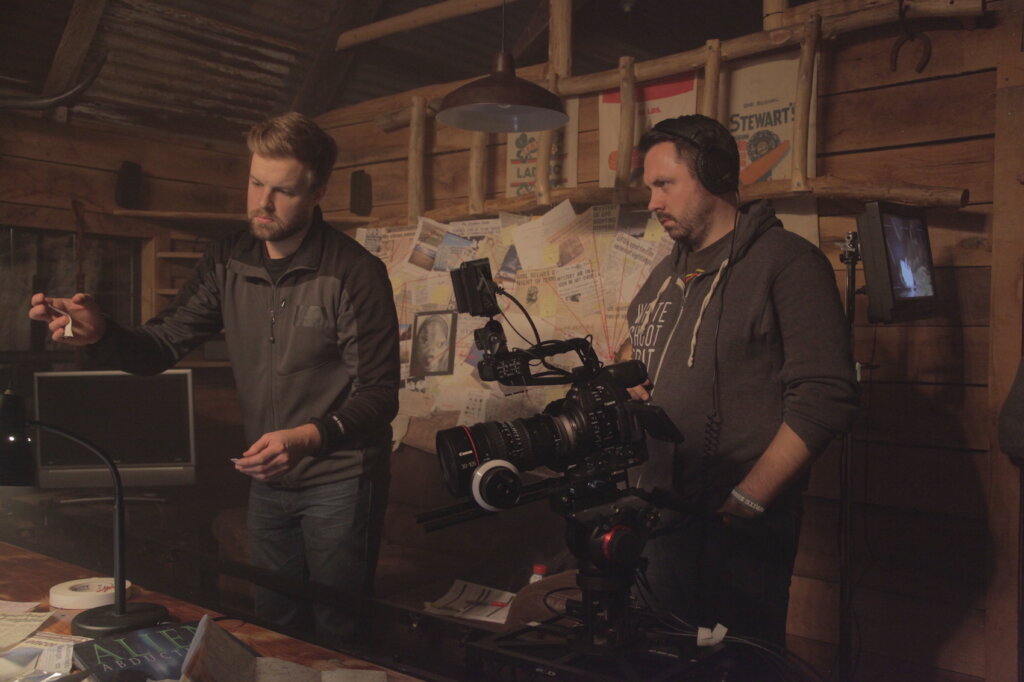
What elements do you think are essential for crafting a compelling story?
I think the most essential element for any story is character. And that applies to everything, not just film. If you look at a reality TV show, say American Idol, you don’t really care about each of the individual contestants until the show gives you their back story, tells you who they are, and tells you what they’ve been through. What trials and tribulations have they gone through to get there? Do they deserve this or not? Can you relate to them or not? And so you get these emotional stories and you’re able to build all this empathy following their story, and all of a sudden you’re rooting for these people.. So, for me, that is the essential part of any feature. With my short films, I’m really more focused on how to deliver an experience to the audience. It’s more of a training ground for me. But with all the feature films that I’m developing and writing the concentration is on character, what are they going through? What does this story mean for them? I always boil it down to “my story is about X character who goes through Y event and it turns out Z in the end, and also there’s a monster or there’s a heist or there’s a wedding or there’s a love triangle”—whatever that additional thing is. But really what the story is about is the character that goes through something and learns something because of it.
How important is music in your work?
I feel very Spielbergian about music. Most of my stuff is wall-to-wall music since I love using music as another piece of dialogue in the film. Without words, it’s speaking to the audience, whether aggressively or quietly in the background. It’s just one more tool to help land the experience that I’m trying to design for the viewer.
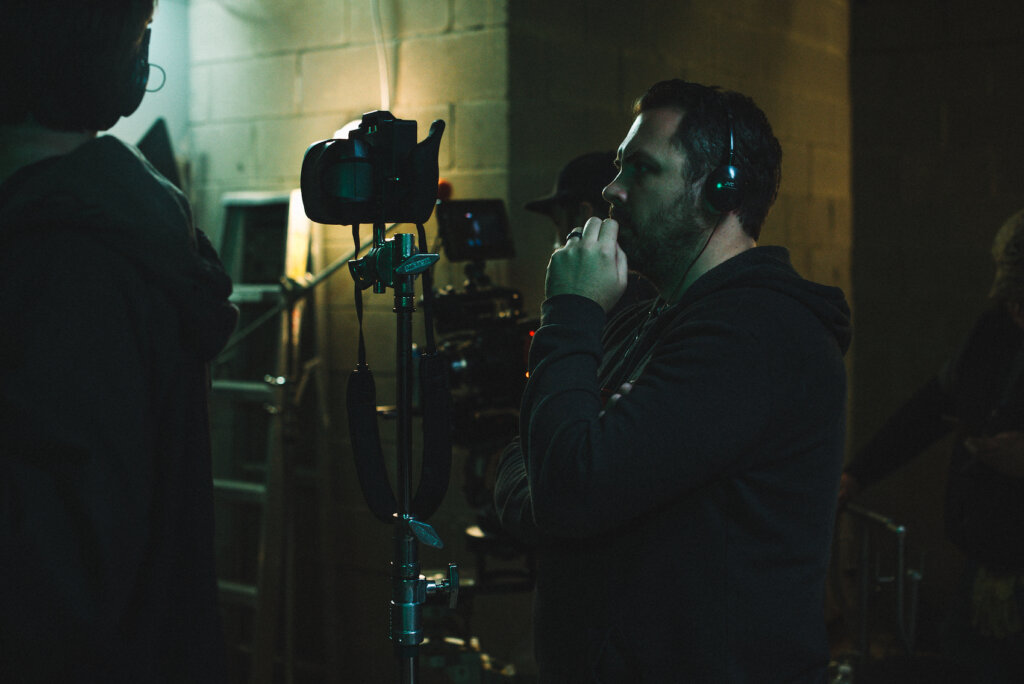
What advice would you give other filmmakers and creators who are just starting their careers?
It’s the same advice I’m sure you’ve heard before: you just need to make things. Make as much stuff as possible; there’s really no substitute. It’s why at the end of every episode, I say write, shoot, edit, repeat. I truly believe that’s the only way to hone your craft. I think that goes for whatever creative field you’re in too. You have to do that thing over and over again. If you want to be a writer, write as many scripts as possible. If you want to be a director, direct as many scenes as possible. And it doesn’t have to be a five-minute short, a 10-minute short, or a half-hour-long thing. It could be a one-minute thing or a two-minute thing. The whole idea is to try ideas. I did that very consciously throughout Film Riot. All the sketches we do within the show are done very quickly. They’re not done at the level of what we can actually pull off. But that’s not the idea. We’re not trying to make it look perfect; we’re just trying different concepts. If I do this, will the audience understand that? If I do this, will the audience feel fear? If I do this, will they laugh? So, that’s my main advice. Just make as many tiny little things, trying all the different concepts you have in your mind of how you can convey your idea to an audience, and do that over and over again.
How do you find the balance between pushing boundaries creatively and delivering what your client wants or audience wants to see?
Early in my career (maybe just from being naive), I didn’t think about the audience or client at all. I just did what I wanted to do, what I thought would be cool, scary, or funny. Early on in the Film Riot days, when I would write scripts, people didn’t really get my humor on the page. But then when they saw it in the end, they laughed. Thankfully, I didn’t care; I thought it was funny, and I was just basically making it for myself. Even when we did ads on Film Riot, clients would have suggestions of what they wanted, and we would usually end up going in a totally different direction with what we thought would be better. And thankfully, they usually liked it. But as time went on, I started thinking, maybe I should be thinking more about the audience and giving the audience what they want. But over time, I realized that that’s actually a toxic position for a filmmaker to be in. Denis Villeneuve says he makes his films for one audience member, and it’s him. And I really agree with that. Now, I think that’s how you get that one singular unified voice that’s saying something interesting. I think if you chase what an audience wants, that’s when you get the same stuff over and over again because you’re chasing things they already connected to instead of making something new. So for me, I’m focusing on what I want to see, that movie I’m desperate to watch. And I know there’s going to be other people that share my taste, so in the end, it’s for them too.
What is the most challenging aspect of being a filmmaker/creative?
I think it boils down to rejection. You make this thing that was just for you, but now you are releasing it as a gift you are giving to strangers. Some will love it, and some will hate it, but the hate always feels so much louder; you really feel the rejection because the thing you made is a part of you. The same goes with pitching features; it’s a whole parade of rejection, and after a while, that does get you a bit winded. So, I would say that is easily the most difficult part—to continue to take those gut punches, then get back up and keep going without constantly second-guessing yourself.
What are some of your favorite projects that you’ve worked on?
One of my favorites is Proximity. It’s a short film that we shot in 2013 for $300 on this empty plot of land. It came about because a much larger project fell apart last minute. It was going to be well over $300,000, and we were about to shoot with a huge crew and practical explosions. We had set builders who had worked on films like Transformers out in Austin building stuff for us. We were going to have over fifty people in special effects makeup, etc., but the whole thing ended up falling apart, and very publicly. We shared about it all on Film Riot and were very honest about what was going on because we’ve always wanted to be transparent and allow others to learn from both our successes and failures.
So, to follow our own advice, instead of taking the defeat, we grabbed a couple of friends and made something anyway. It was some of the most fun I’ve had making something because it was so run-and-gun. It was brutal. We were in the middle of nowhere. We all got our ankles cut up by these thorny bushes. We were running around in the mud, and I just love what came out of it, and the friendships that were made from it.
How do you search for music on Musicbed? What are some tips that you give other filmmakers to search on Musicbed?
I love the new AI search feature. I’ve always had a difficult time finding the types of music that I need, and honestly, I’ve always found search functions on music sites to be a tad frustrating. So this new AI feature has completely changed the game for me when it comes to finding the right tracks.
Why do you utilize Musicbed in your work?
There needs to be a certain level of quality in a song to really make it land emotionally within whatever you’re trying to do, whether it’s a joke or a very serious dramatic moment. You need to have a certain depth of quality to it, and that’s not just technically. There has to be that extra something. The artist had something to say. The artist made this with love. It wasn’t just something to sell or something to get popular. There’s so much of that on Musicbed, where there’s true artistry within this music, and when you get those things, whether the viewer knows it or not, it does elevate the whole. It is that extra ingredient of, I suppose, authenticity, within the music that is so vital to making something land.
—
Explore a curated playlist of Ryan’s favorite music to use in his films—available to license only on Musicbed.















































































